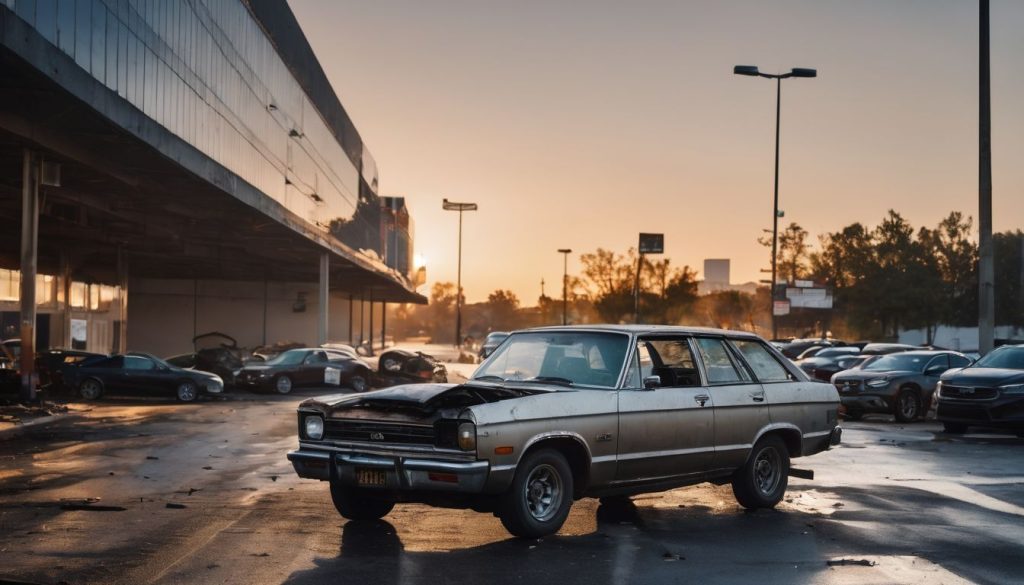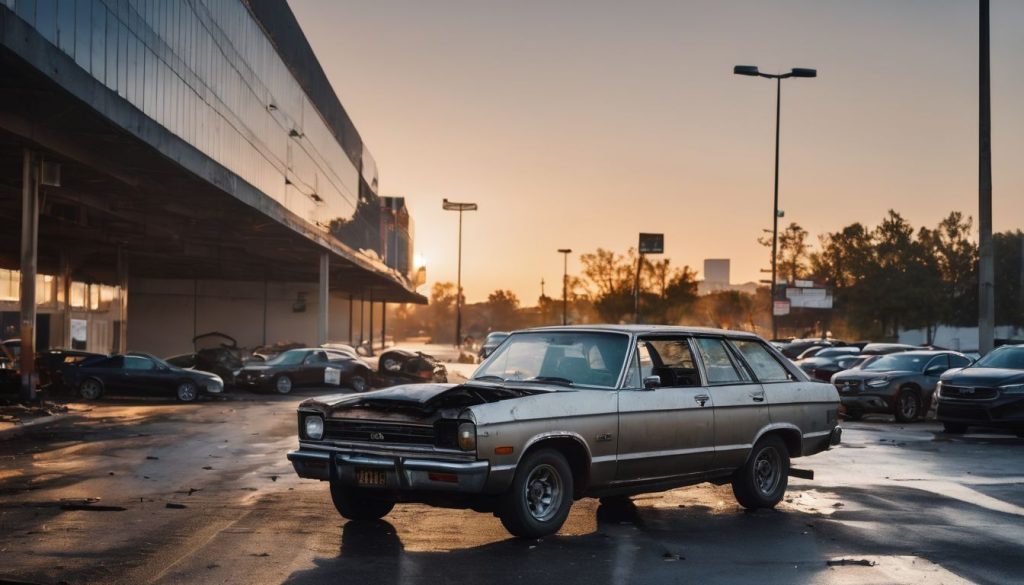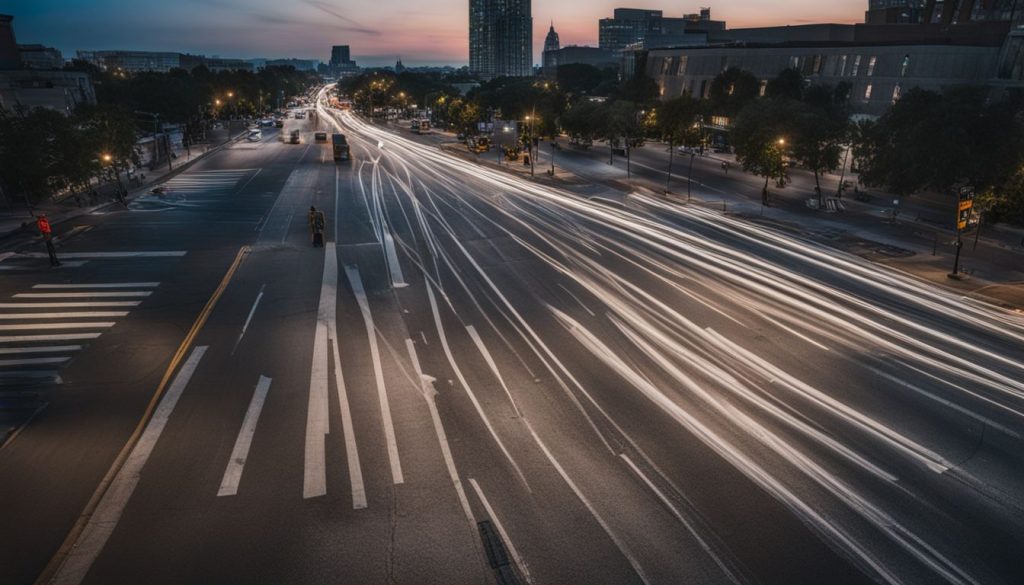Many people worry if a car crash might haunt them during a job hunt. Surprisingly, 69% of employers dig into candidates’ histories before hiring, potentially including driving records alongside credit and criminal checks.
This article unveils whether car accidents appear on background checks and the effects on employment opportunities. Discover the truth below and secure your professional future.
Key Takeaways
- Car accidents usually don’t show up on criminal background checks unless there’s a traffic violation like DUI or reckless driving.
- Driving records are checked for jobs that require driving, and serious violations can make it hard to get hired.
- Civil lawsuits from car accidents and traffic warrants also appear on background checks and can impact job opportunities.
- Checking your own driving record is important to ensure accuracy and fix any mistakes before applying for jobs.
- Accidents with legal issues or those leading to court can become part of your public record and influence employment decisions.
What Does a Background Check Consist Of?
A background check digs into a person’s past. It might look at their criminal record, where they went to school, and if they have filed for bankruptcy. Employers also check driving records to see if there are any major traffic offenses or car accidents.
These checks can find different things depending on where you live. They often involve a search through public records and databases. Sometimes, employers hire companies to do this for them.
These companies make sure that the information is correct and follows the law.
For jobs that involve driving, like truck drivers or cab drivers, your driving history becomes very important. Employers want to know about any car accidents or serious tickets you might have gotten.
This helps them decide if you’re safe behind the wheel.
Background checks serve as a way for employers to protect themselves and others. They need to know who they are hiring and if there could be risks involved with choosing someone with certain types of offenses in their past.
Car Accidents and Background Checks: The Connection
Understanding the intersection between car accidents and background checks is crucial, as it illuminates a nuanced aspect of personal history that could influence employment decisions.
This section will delve into whether incidents on the road translate to entries on one’s formal record, revealing their potential bearing on job prospects and future opportunities.
Do Car Accidents Show Up on Background Checks?
Car accidents themselves usually don’t appear on standard criminal background checks. But if the incident involved a traffic violation, like illegal parking or speeding tickets, it could show up on your driving record.
Employers often check these records when hiring for jobs that involve driving.
If you faced charges or were found guilty of DUIs or reckless driving, this will likely appear on a criminal background check. This is important information for employers who need to trust their drivers.
Knowing how past events could affect job prospects helps people understand what potential bosses might see about them.
Impact of a Traffic Violation on Job Prospects
A traffic violation can make getting certain jobs harder. If the job requires driving, employers will look closely at your driving record. They might not hire someone with serious violations like DUIs.
These violations show up in background checks and raise red flags for employers considering safety and reliability.
Jobs involving transportation, such as truck or taxi drivers, may be off-limits after a major traffic incident. Employers use criminal background checks to find DUI convictions and other offenses.
Even if you’re not applying for a driving job, some companies consider your entire criminal history. This includes any crimes related to car accidents or serious traffic law-breaking.
Other Driving-Related Factors That May Appear on a Background Check
Understanding the scope of a background check is crucial, as it may reveal various driving-related factors beyond mere accidents. These elements can range from litigations stemming from on-road incidents to outstanding traffic warrants, all of which hold potential implications for an individual’s personal and professional life.
Car Accident Lawsuits
Car accident lawsuits can make their way onto background checks. If someone sues you for a crash, it becomes part of the public record. Employers may see this when they look at civil court records during your job application process.
Lawyers often handle these cases to help recover damages or expenses after an accident.
If found guilty, the lawsuit verdict might suggest who caused the accident. This could affect future employment, especially if driving is a big part of the job. It’s important to know that personal injury claims serve two purposes: covering costs and clearing names in fault disputes.
These details are crucial for employers considering safety and responsibility in hiring decisions.
Traffic Warrants
Traffic warrants can appear on your background check. If you fail to pay fines or miss court dates for traffic tickets, the court might issue a warrant for your arrest. Employers see this as a red flag because it suggests you might not follow rules or meet responsibilities.
Police officers may also detain individuals with outstanding warrants, which could lead to custody and possibly show up on criminal records checks. This situation looks bad to companies that value reliability and lawfulness in their employees.
It’s important to handle traffic citations promptly to avoid getting a traffic warrant in the first place.
Civil Lawsuits related to traffic incidents
Civil lawsuits can come from traffic incidents where someone gets hurt. If a court finds you at fault in an accident, you could owe money for the other person’s medical bills and car repairs.
This happens in personal injury cases. People sue to get money for their losses or injuries.
Lawyers often help with these cases. They work to show who was wrong in the accident. A personal injury attorney will fight for their client’s side in court. Courts look at evidence, like police reports and witness statements, to decide who pays for the damages.
Hit and Run Incidents
Hit and run incidents bring serious trouble for your job search. If you’re caught leaving an accident scene, it can hurt your chances of getting hired. This is especially true for truck drivers and cab drivers.
Their jobs depend on having a clean driving record.
If you have a hit and run on your record, you might need a lawyer’s help to clear things up. An attorney can fight to show who really was at fault in the accident. It’s important because such incidents affect how employers see you.
They may think twice before offering you a job if they find out about it in a background check.
Understanding Car Accidents with Insights from Experienced Lawyers
Attorneys advise that car accidents can sometimes lead to more than just insurance claims. If an accident involves serious injuries or property damage, it may end up in court. Lawyers will look at who broke traffic laws or was negligent.
This means they check if someone did not take care to avoid harm. For instance, driving way over the speed limit and causing a crash could lead to a lawsuit.
Insights from legal professionals show that such lawsuits become part of public record. These records can appear on background checks, especially if they result in criminal charges like DUIs or hit and run incidents.
They explain that while most accidents don’t end up with criminal charges, those that do can affect someone’s job hunt. Employers might worry about hiring someone with a history of unsafe driving for jobs involving driving or transporting goods.
The Impact of Accidents on Employment Opportunities
The presence of car accidents on one’s driving record can significantly influence employment opportunities, particularly in roles where driving is a central job responsibility. Employers scrutinize driving histories to assess risk and liability, making it crucial for candidates to understand how their on-road conduct could affect their professional trajectory.
Acceptable Driving Record for Employment
Employers often look at your driving record before hiring you. This matters most for jobs that need a lot of driving, like truck or cab drivers. A clean record shows you are careful and follow the law on the roads.
If you have serious violations, like DUIs, it can make finding a job harder.
Companies use your driving history to decide if they should hire you. They get this information from the department of motor vehicles. A good driving record could mean lower car insurance rates for them and less chance of accidents at work.
Some traffic tickets might not be a problem, but criminal charges for bad driving often worry employers.
Effects of a Bad Driving Record on Employment
A bad driving record can make it hard to get certain jobs. Companies often look at your driving history when you apply for a job that involves driving. If they see serious problems like DUIs or major accidents, they may not hire you.
Truck drivers and taxi drivers need clean records to work. Even if the job isn’t about driving, employers might worry about how responsible you are.
Your chances of getting hired can drop with a poor driving record. Some companies in Southern California and beyond won’t look at applicants with bad records. They check to make sure you are safe and reliable.
A good record tells them you follow rules on and off the road. This matters a lot in places where safety is key, like Silicon Valley tech firms or Los Angeles County delivery services.
Frequently Asked Questions About Car Accidents and Background Checks
Understandably, many individuals have pressing inquiries regarding the interplay between car accidents and background checks. This section addresses common questions that arise when navigating the complexities of how vehicular incidents may affect one’s personal record in professional contexts.
How Long Does it Take For an Accident to Show Up on Your Driving Record?
An accident may appear on your driving record within a few days to a couple of weeks. This varies by state and depends on when the accident report is filed with the local DMV. For instance, in California, law enforcement sends reports to the California Department of Motor Vehicles (DMV).
Once processed, these accidents are reflected on your driving record which insurance companies and employers can view. Your record includes details about any traffic violations or collisions you’ve been involved in.
It’s smart to check your own driving record after an accident. Errors can happen in police reports leading to wrongful blame. Make sure everything listed is accurate because this information impacts your job prospects, especially if you’re applying for positions that require a good driving history like commercial drivers or contractors.
Always review your driving record regularly so it stays clean and accurate, helping you avoid unnecessary setbacks in employment opportunities due to outdated or incorrect information being seen by others.
Can A Non Reportable Accident Show Up on Your Driving Record?
A non-reportable accident usually means there was minor damage and no one got a ticket. These accidents may not go on your driving record. Police might not even come to the scene. Most times, if police do not file a report, the accident stays off your record.
If you were in a small bump-up and no report was made, it’s likely safe from background checks. Insurance companies also often don’t know about these incidents unless you tell them when asking for coverage quotes.
So, minor fender benders without reports typically don’t affect job prospects or appear on records that employers see.
Will Accidents on My Driving Record Show Up on an Employment Background Check?
Employers often check your driving record when you apply for a job. They want to see if you have accidents or serious traffic issues like DUIs. These things can affect your chances of getting hired, especially for jobs where driving is important.
Your driving history tells employers how responsible and safe you are on the road.
Accidents that lead to court cases or criminal charges show up on background checks. If an accident was serious enough to go to court, it could be part of your public record. Employers can use this information in their hiring decisions.
However, minor fender-benders without legal action usually don’t appear unless they’re connected to other violations.
Conclusion
In the end, car accidents can mark a background check, especially if there’s a legal tangle or criminal charge. A clean driving record matters for jobs where wheels are key. Check your own records to stay informed and correct errors if they pop up.
It’s all about knowing what could be out there and staying one step ahead. Drive safe, work smart!
Cindy Cordova is a seasoned legal writer with over seven years of experience crafting clear, informative, and professional content for law firm websites. With a B.A. in English from Trinity Christian College, she combines her strong writing background with a deep understanding of legal topics to help firms connect with their clients through trustworthy and accessible content.













